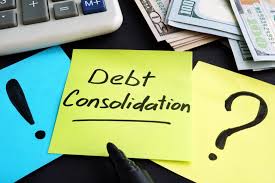Most of us are struggling to get out of debt; everything from mortgages, credit card debt, loans. Everywhere there are BILLS, BILLS, BILLS. One way to get all those bills in check when they become so overwhelming is through debt consolidation. Debt Consolidation is the process of combining all of your unsecured debts into a single monthly payment. Debt consolidation might be done with a debt consolidation loan. The loan is used to pay off your debts, then you pay off the new consolidation loan rather than dividing your payments to your creditors. You may be able to take out a debt consolidation on your own using a home equity loan or a debt consolidation loan from a bank.Debt consolidation is a financial strategy, merging multiple bills into a single debt that is paid off by a loan or through a management program.
Debt consolidation is especially effective on high-interest debt such as credit cards. It should reduce your monthly payment by lowering the interest rate on your bills, making it easier to pay off the debt.This debt-relief option untangles the mess consumers face every month trying to keep up with multiple bills from multiple card companies and multiple deadlines. Instead, there is one payment to one source, once a month.And it saves you money at the same time
How Does Debt Consolidation Work?
Debt consolidation works when it lowers the interest rate and reduces the monthly payment to an affordable rate on unsecured debt such as credit cards.
The first step toward making debt consolidation work is calculating the total amount you pay for credit cards every month and the average interest paid on those cards. That provides a baseline number for comparison purposes.
Next, look at your monthly budget and add up spending on the basic necessities like food, housing, utilities and transportation.
For many people, there is enough left to handle their debt if they organize their budget better and get motivated to pay down debt. However, those characteristics – effective budgeting and motivation – aren’t generally evident when people fall behind on their bills.
And that’s is where a debt consolidation loan or debt management program can step in. Each requires one monthly payment (organization) and allows you to track your progress as you eliminate the debt (motivation).
Common Methods
Consolidating with a home equity loan can be risky since your unsecured debt comes secured by your home. If you can’t afford the payments, your home could be foreclosed. That wouldn’t happen if your unpaid debts remained on separate credit cards.
If you hire a debt consolidation company, your loans may not necessarily be consolidated with a loan. Instead, your debts remain separate, but your payment is consolidated. You send one monthly payment to the debt consolidation company then that company divides your payment and sends it to all your creditors.
It Does Not Reduce Your Debt
After consolidating your debt, you may feel like your debt burden has lifted. However, it’s important to remember that you still have the same amount of debt as before. Now, instead of having multiple accounts to pay, you have just one.
Pros and Cons Debt consolidation is generally beneficial only when the final consolidated debt has a lower monthly payment or interest rate or both. While this makes it much easier to afford your monthly debt payment, it’s often achieved by lengthening your repayment period. You’ll ultimately end up paying on your debt longer than if you’d left your debt unconsolidated. The longer repayment period also means you’ll also pay more interest on your debt.

Debt Consolidation with a Loan
The conventional method for consolidating debt is to get a loan from a bank, credit union or online lender. The loan should be large enough to eliminate all the unsecured debt at one time.
The loan is repaid in monthly installments at an interest rate you negotiate with the lender. The repayment period is normally 3-5 years, but how much you interest you are charged is the key element.
Lenders look closely at your credit score when determining the interest rate they charge for a debt consolidation loan. If you are falling behind paying off your credit card debt, it’s very likely your credit score is tumbling, too.
If the interest rate you get for a debt consolidation loan is not lower than the average interest rate you already were paying on your credit cards (see above), then a debt consolidation loan does you no good.
There are alternative loan possibilities such as home equity loans or personal loans, but neither helps if you can’t improve the interest rate you’re paying or the repayment period is so long it doesn’t make sense.

Debt Consolidation without a Loan
It is possible to consolidate your debt and reduce your monthly payments without taking out another loan.
Credit counseling agencies offer nonprofit debt consolidation through a debt management program, which doesn’t require the consumer to take out a loan.
Instead, the nonprofit credit counseling agencies work with card companies to reduce the interest rate and lower the monthly payment to an affordable level for the consumer.
…if you’re ready to turn your financial life around, debt consolidation can help do it.
The consumer sends a monthly payment to the credit counseling agency, which then distributes the money to each creditor in an agreed upon amount. The agency may also get the card companies to waive late fees or over-the-limit fees.
This is not a quick solution. Debt management programs usually take 3-5 years to eliminate debt. If you miss a payment, they can revoke whatever concessions were made on your interest rate and monthly payment.
When Is Debt Consolidation Not a Good Option?
If you don’t plan to change your spending habits – i.e. you still plan to use your credit card for anything you want – then debt consolidation is not for you. The chase to catch up with your bills will never end.
Putting the credit card away would be a first step, but not the only one you need to consider before deciding that debt consolidation is your financial savior. Here are some other questions you need to answer:
- Are you willing to make a serious monthly budget and stick to it?
- Does taking out a new loan to pay off old loans (credit card debt) make sense?
- Are you willing to calculate whether the fees and costs associated with a debt consolidation loan – not to mention the length of the repayment period – will end up saving or costing you more money than your current payment arrangement?
- Do you understand that a debt management program requires a constant, on-time monthly payment in order to retain the privileges of the program?
It is truly important to understand all aspects of debt consolidation before you decide that this is best for you.


Like!! Thank you for publishing this awesome article.
LikeLike
My husband and I used national debt relief. We only have 2 grand left to pay! What a relief. We worked so hard for this but it is totally worth it
LikeLiked by 1 person
Congratulations. When its paid, I’m sure that will be a huge sense of relief for you.
LikeLike